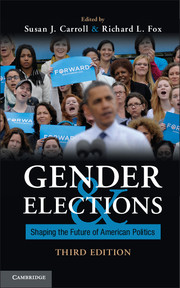Book contents
- Frontmatter
- Contents
- List of Figures, Text Boxes, and Photos
- List of Tables
- Contributors
- Acknowledgments
- Introduction
- 1 Presidential Elections
- 2 Cracking the “Highest, Hardest Glass Ceiling”
- 3 Voter Participation and Turnout
- 4 Voting Choices
- 5 Latinas and Electoral Politics
- 6 African-American Women and Electoral Politics
- 7 Congressional Elections
- 8 Political Parties and Women's Organizations
- 9 Advertising, Websites, and Media Coverage
- 10 Women's Election to Office in the Fifty States
- Index
- References
4 - Voting Choices
How and Why the Gender Gap Matters
Published online by Cambridge University Press: 05 June 2014
- Frontmatter
- Contents
- List of Figures, Text Boxes, and Photos
- List of Tables
- Contributors
- Acknowledgments
- Introduction
- 1 Presidential Elections
- 2 Cracking the “Highest, Hardest Glass Ceiling”
- 3 Voter Participation and Turnout
- 4 Voting Choices
- 5 Latinas and Electoral Politics
- 6 African-American Women and Electoral Politics
- 7 Congressional Elections
- 8 Political Parties and Women's Organizations
- 9 Advertising, Websites, and Media Coverage
- 10 Women's Election to Office in the Fifty States
- Index
- References
Summary
Women voters have received special attention from the presidential candidates in recent elections primarily because of differences between women and men in their political preferences, a phenomenon commonly referred to as the gender gap. Statistically, a gender gap can be defined as the difference in the proportion of women and the proportion of men who support a particular politician, party, or policy position. In the 2012 election, Barack Obama received 55 percent of women's votes compared with 45 percent of men's, resulting in a gender gap of 10 percentage points.
A gender gap in voting has been evident in every general election for president since 1980. In each of the last nine presidential elections, a greater proportion of women than men has voted for the Democratic candidate. For example, in 2008, when Barack Obama was first elected, 56 percent of women, compared with only 49 percent of men, cast their votes for him, resulting in a gender gap of 7 percentage points – somewhat smaller than the gap in 2012.
Prior to the 1980 election, it was widely believed that women and men took similar positions on most issues, had similar political preferences, and voted in much the same ways. In other words, the assumption before 1980 was that gender did not matter much in voting. Today, the assumption is exactly the opposite – that gender does matter for politics. Women and men, in the aggregate, have different positions on many issues and tend to vary in their party identification and support for political candidates.
- Type
- Chapter
- Information
- Gender and ElectionsShaping the Future of American Politics, pp. 119 - 145Publisher: Cambridge University PressPrint publication year: 2013
References
- 5
- Cited by



